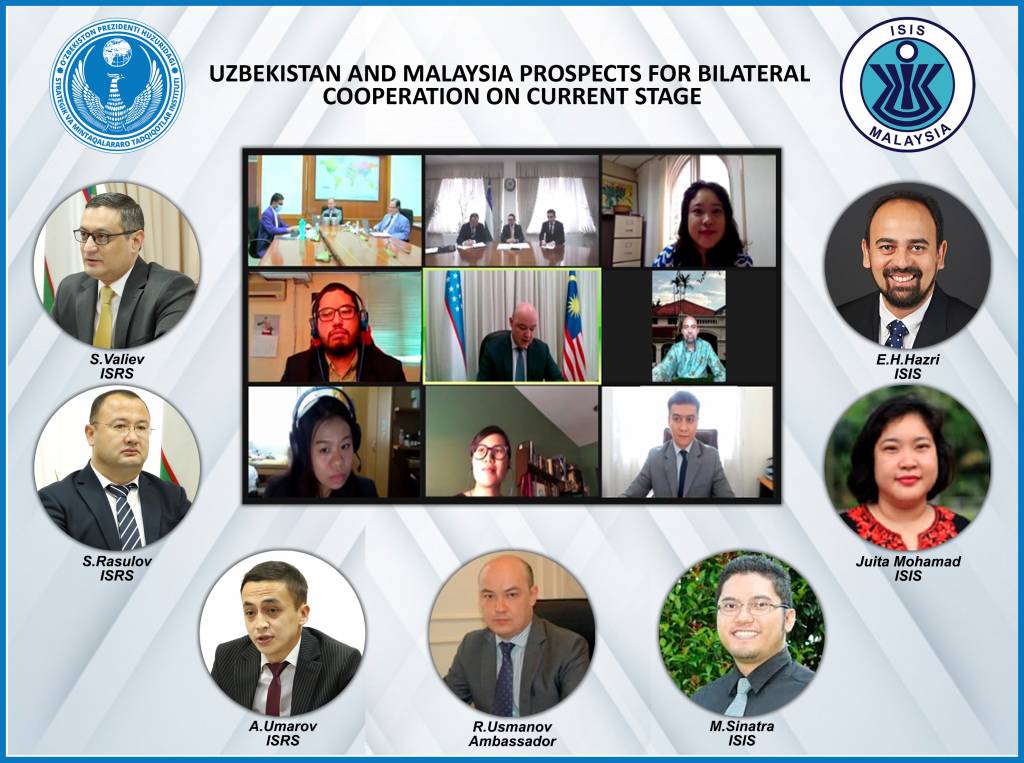ISRS: Strategy of Uzbekistan’s President covers a set of socio-economic measures for the country’s development

On 4 December 2020, an online conference was held on the topic "Uzbekistan and Malaysia: prospects for bilateral cooperation at the present stage."
During the event, organized by the Institute for Strategic and Interregional Studies under the President of the Republic of Uzbekistan (ISMI), together with the Institute for Strategic and International Studies of Malaysia (ISMIM) with the support of the Embassy of the Republic of Uzbekistan in Kuala Lumpur, experts analyzed the current state and prospects of bilateral cooperation.
Opening the online dialogue, the Ambassador of the Republic of Uzbekistan to Malaysia Ravshan Usmanov described the dynamics of the development of Uzbek-Malaysian relations in recent years. The diplomat pointed out the presence of an impressive potential for expanding bilateral and multilateral interaction between the countries.
An important basis for strengthening multilateral cooperation between Uzbekistan and Malaysia, as Usmanov noted, can serve as initiatives voiced by the President of the Republic of Uzbekistan at the 75th session of the UN General Assembly, such as the adoption of the International Code on Voluntary Commitments of States during Pandemics, the International conference dedicated to the 10th anniversary of the Joint Plan of Action of the Central Asian Countries on the Implementation of the Global Counter-Terrorism Strategy ”.
In turn, the deputy director of ISMI Sanjar Valiev stressed that today almost all countries of the world are experiencing a very difficult period of socio-economic development due to the pandemic. In these conditions, the economy of Uzbekistan, being part of the global economic system, is influenced by the negative consequences of the coronavirus crisis.
In response to it, the President of the Republic of Uzbekistan Shavkat Mirziyoyev adopted a purposeful strategy that systematically encompasses a set of socio-economic measures for the development of the country in difficult modern conditions.
ISMIM Executive Director Ensik Herizal Khazri outlined the most promising areas of bilateral cooperation in areas such as economic development and security. In his opinion, the elimination of the consequences of the pandemic requires the combined efforts of all countries of the world.
In this regard, Uzbekistan and Malaysia are facing similar tasks of post-crisis recovery, solving which the parties can assist each other, adopting best practices.
The head of the ISMI department Sadullo Rasulov presented the experience of Uzbekistan in mitigating the consequences of a pandemic, which is based on the following main approaches:
- mobilization of all forces and capabilities, as well as available resources to identify those infected at an early stage and prevent them from infecting others;
- a comprehensive analysis of the current situation and forecasting the course of its development, development and implementation of adequate preventive and sanitary-epidemiological measures;
- strengthening of cooperation and coordination of activities with all profiling foreign state and international organizations.
In turn, a researcher at ISMIM Juita Mohamad noted that Malaysia, like other countries, has been severely affected by the coronavirus. Speaking about the development of relations in the post-pandemic period, the expert emphasized the need to expand cooperation based on the principles of openness and international law.
In her opinion, cooperation in the digital economy and the introduction of modern technologies can become important aspects of Uzbek-Malaysian interaction. At the same time, the expert drew attention to the similarity of the approaches of the strategies of Uzbekistan and Malaysia in strengthening support for youth and women, as well as socially vulnerable segments of the population.
The results of the event demonstrated the existence of significant potential for expanding mutually beneficial cooperation through the preparation of recommendations on the most promising bilateral and multilateral projects.






